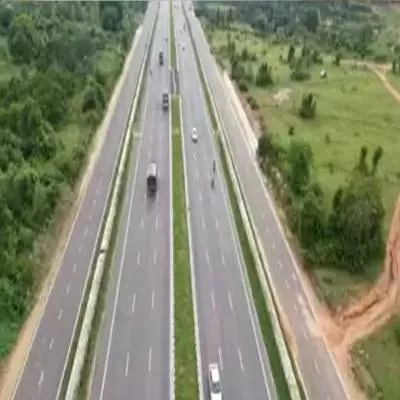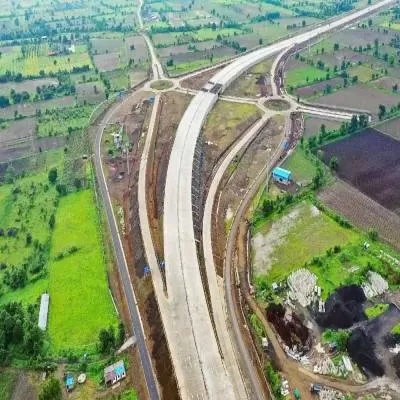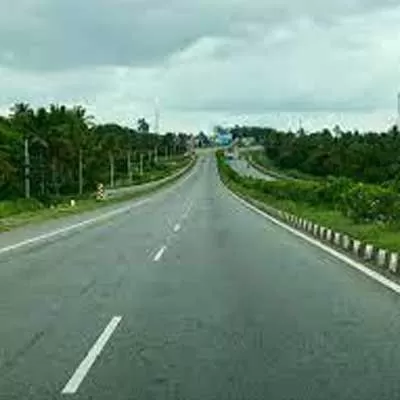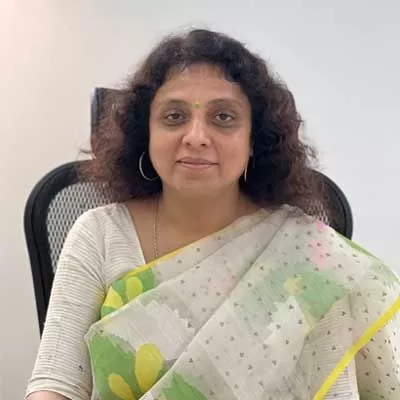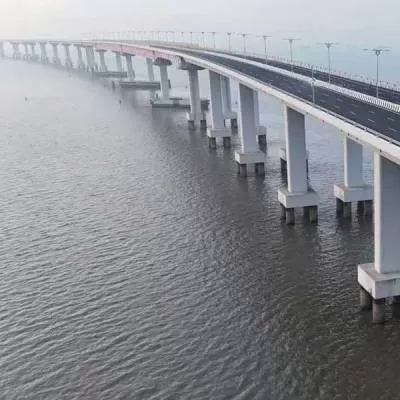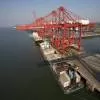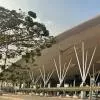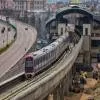- Home
- Infrastructure Transport
- ROADS & HIGHWAYS
- Our CAGR over seven to eight years has been above 50 per cent
Our CAGR over seven to eight years has been above 50 per cent
It's a product of a shared dream - one that has been transformed into reality. Conceived by Chairman Alla Ayodhya Rami Reddy and Managing Director YR Nagaraja, Ramky Infrastructure, the flagship company of the Ramky Group, is a major player in the Indian infrastructure industry today. M Goutham Reddy, Executive Director, Ramky Group, shares the company's journey and offers his perspective on the industry in conversation with Shanti Padukone. Excerpts...
How has the industry evolved over the years?
The opportunity in the infrastructure sector has increased manifold from simple EPC projects, which were the norm, and small-value, small-time projects to large projects and high-quality infrastructure.
Your company essentially operates in two business segments: construction and development. How do they differ from one another?
The construction segment is basically an EPC business - which you build to somebody's design. Over the past ten years or so, the government has decided to develop infrastructure at a pace faster than they can invest. As a result, they chose the public-private partnership (PPP) mode to bring private financing into public infrastructure. That portion of the business is the developer business, where we invest in our infrastructure and recover the money over the operating period of the act.
What sectors do you operate in?
We operate in fixed areas including urban infrastructure like water and wastewater management, roads, buildings, irrigation projects, industrial construction, and power transmission and distribution. Our activities have been equally spread over the water and roads sectors in the past few years though traditionally we played a large role in the former.
Briefly tell us about your landmark projects each in the construction and developing businesses?
In the development sector, we are working on a large number of NHAI projects, which are the larger projects by value. We are building roads from Srinagar to Baniyal in Jammu and Kashmir, Jorhat to Shillong in Assam and Meghalaya, and Narkatalli to Abhyanki in Hyderabad and we have completed one stretch of outer ring road. Other than roads, we believe our core competence is industrial infrastructure development. One of our milestone projects is Pharma City in Visakhapatnam, an exclusive, 2,300 acre sector-specific industrial park. In the EPC segment, we have done a 170 mld sewage treatment plant for Hyderabad Metro water supply and a 102 mld water treatment plant in Amravati in Maharashtra.
Waste and water management projects seem to be your USP...
Yes; before starting the company, our chairman was a civil engineer in companies that focused on water treatment plants. Today, municipal supply is far from hygienic in India. And in sewage, not a single treatment plant meets surface water discharge standards. Thus, the opportunity in this segment is the largest, followed by roads. Our contribution is close to
5 per cent to 7 per cent, which is not really on a par with global standards. In India, most projects have been carried out on an EPC level; water is yet to evolve in the development segment, which will happen when privatisation is allowed in a big way.
What technologies have you used in your projects, especially in wastewater management?
Many large water treatment projects have been carried out with the principle technology called the activated sludge process. Another technology used of late is the membrane bio reactor. Going forward, ultra filters and membrane bio reactors solutions will come into the country.
Tell us about your quality management systems.
We are quality, health and safety conscious and certified ISO 9000, ISO 14000 and ISO 17000 for numerous projects. We also adhere to strict environment policies, which are well implemented.
The number of orders till March 2011 is more than double of the figure for 2010. What would you attribute this rapid growth to?
Our CAGR has been upwards of 50 per cent over the past seven to eight years, which indicates that year-on-year growth must be extremely large. So we tend to stay focused on improving competence. We do not bid aggressively and, surprisingly, do not set any targets for business development as we believe it can lead to aggressive bidding.
How is Ramky combating the manpower crunch plaguing the industry?
It is certainly an issue, given that there are two kinds of manpower. The first is operating executives, who are civil engineers; there is a significant shortage primarily because, for the past 10-12 years, there has been resistance to enter the civil engineering field. We are trying to overcome this by tying up with agencies like NICMAR (National Institute of Construction Management and Research), which has recruitment retention policies wherein we train people to become construction managers if not civil engineers. The second kind of manpower is the workforce. We are trying to overcome this paucity by increasing mechanisation and improving technologies.
What is your take on the constant repo rate hikes by the RBI?
In a growing economy like India, interest rates have to come down substantially. The very idea that a rise in interest rates should curb inflation somewhere is counterproductive. I don't think it is fundamental or sustainable, given the fact that India is a growing economy and we need to have subdued interest rates. The money value has to come down to about 8 per cent; in the long term, which is where we invest our money as developers, it will balance out over a period of time to around 10-10 œ per cent, which is a value that is typically well below the bidding interest rates for most EPC and infrastructure companies. In the EPC segment, which faces a short-term impact via the annual balance sheet, I think all companies are being affected and the rate of impact is ranging from 0.4 per cent to 1 per cent at a profit-after-tax level. As a company, we have a 0.4 per cent impact on profitability compared to revenue. This has to come down for the sector to grow.
There are various issues regarding land acquisitions, delays in clearances, etc. What in your opinion can be done for smoother execution of infrastructure development?
The government needs to be more prudent and cautious. With this, infrastructure will grow at a faster rate and the government will benefit too. Today, in an urgency to get a project awarded, they are awarding projects where land acquisition is not comprehensive or completed. The government itself will be held liable somehow or the other for its delays in procuring land. Hopefully, they will learn from their mistakes.
How do you see the future of Ramky Infrastructure?
It is bright as infrastructure in India will continue to be built for the next 15 to 20 years. This will brighten the prospects of EPC and infrastructure companies and Ramk will surely find its place in the sector. We are going in the right direction.
Fact sheet:
- Established: 1994
- Top Management (Promoters): Ayodhya Rami Reddy, Chairman; YR Nagaraja, Managing Director
- No. of Employees: 2,754 (As on 31 October, 2011)
- Centre of Operation: Hyderabad, Delhi, Kolkata, Ahmedabad, Bhopal, Bengaluru, Chennai, Mumbai, Sharjah and Gabon
- Ongoing Projects: 265 (As on 31 October, 2011)
- Upcoming projects: 20 (L1 projects as on 31 October, 2011)
- Turnover: Rs 3,118.00 crore (FY11) (consolidated)
- Current order book: Rs 11,893.57 crore (As on 30 September, 2011)
Goutham Reddy M, Executive Director, Ramky GroupIt's a product of a shared dream - one that has been transformed into reality. Conceived by Chairman Alla Ayodhya Rami Reddy and Managing Director YR Nagaraja, Ramky Infrastructure, the flagship company of the Ramky Group, is a major player in the Indian infrastructure industry today. M Goutham Reddy, Executive Director, Ramky Group, shares the company's journey and offers his perspective on the industry in conversation with Shanti Padukone. Excerpts...How has the industry evolved over the years?The opportunity in the infrastructure sector has increased manifold from simple EPC projects, which were the norm, and small-value, small-time projects to large projects and high-quality infrastructure.Your company essentially operates in two business segments: construction and development. How do they differ from one another?The construction segment is basically an EPC business - which you build to somebody's design. Over the past ten years or so, the government has decided to develop infrastructure at a pace faster than they can invest. As a result, they chose the public-private partnership (PPP) mode to bring private financing into public infrastructure. That portion of the business is the developer business, where we invest in our infrastructure and recover the money over the operating period of the act.What sectors do you operate in?We operate in fixed areas including urban infrastructure like water and wastewater management, roads, buildings, irrigation projects, industrial construction, and power transmission and distribution. Our activities have been equally spread over the water and roads sectors in the past few years though traditionally we played a large role in the former.Briefly tell us about your landmark projects each in the construction and developing businesses?In the development sector, we are working on a large number of NHAI projects, which are the larger projects by value. We are building roads from Srinagar to Baniyal in Jammu and Kashmir, Jorhat to Shillong in Assam and Meghalaya, and Narkatalli to Abhyanki in Hyderabad and we have completed one stretch of outer ring road. Other than roads, we believe our core competence is industrial infrastructure development. One of our milestone projects is Pharma City in Visakhapatnam, an exclusive, 2,300 acre sector-specific industrial park. In the EPC segment, we have done a 170 mld sewage treatment plant for Hyderabad Metro water supply and a 102 mld water treatment plant in Amravati in Maharashtra.Waste and water management projects seem to be your USP... Yes; before starting the company, our chairman was a civil engineer in companies that focused on water treatment plants. Today, municipal supply is far from hygienic in India. And in sewage, not a single treatment plant meets surface water discharge standards. Thus, the opportunity in this segment is the largest, followed by roads. Our contribution is close to 5 per cent to 7 per cent, which is not really on a par with global standards. In India, most projects have been carried out on an EPC level; water is yet to evolve in the development segment, which will happen when privatisation is allowed in a big way.What technologies have you used in your projects, especially in wastewater management?Many large water treatment projects have been carried out with the principle technology called the activated sludge process. Another technology used of late is the membrane bio reactor. Going forward, ultra filters and membrane bio reactors solutions will come into the country.Tell us about your quality management systems. We are quality, health and safety conscious and certified ISO 9000, ISO 14000 and ISO 17000 for numerous projects. We also adhere to strict environment policies, which are well implemented.The number of orders till March 2011 is more than double of the figure for 2010. What would you attribute this rapid growth to?Our CAGR has been upwards of 50 per cent over the past seven to eight years, which indicates that year-on-year growth must be extremely large. So we tend to stay focused on improving competence. We do not bid aggressively and, surprisingly, do not set any targets for business development as we believe it can lead to aggressive bidding.How is Ramky combating the manpower crunch plaguing the industry?It is certainly an issue, given that there are two kinds of manpower. The first is operating executives, who are civil engineers; there is a significant shortage primarily because, for the past 10-12 years, there has been resistance to enter the civil engineering field. We are trying to overcome this by tying up with agencies like NICMAR (National Institute of Construction Management and Research), which has recruitment retention policies wherein we train people to become construction managers if not civil engineers. The second kind of manpower is the workforce. We are trying to overcome this paucity by increasing mechanisation and improving technologies.What is your take on the constant repo rate hikes by the RBI?In a growing economy like India, interest rates have to come down substantially. The very idea that a rise in interest rates should curb inflation somewhere is counterproductive. I don't think it is fundamental or sustainable, given the fact that India is a growing economy and we need to have subdued interest rates. The money value has to come down to about 8 per cent; in the long term, which is where we invest our money as developers, it will balance out over a period of time to around 10-10 œ per cent, which is a value that is typically well below the bidding interest rates for most EPC and infrastructure companies. In the EPC segment, which faces a short-term impact via the annual balance sheet, I think all companies are being affected and the rate of impact is ranging from 0.4 per cent to 1 per cent at a profit-after-tax level. As a company, we have a 0.4 per cent impact on profitability compared to revenue. This has to come down for the sector to grow.There are various issues regarding land acquisitions, delays in clearances, etc. What in your opinion can be done for smoother execution of infrastructure development?The government needs to be more prudent and cautious. With this, infrastructure will grow at a faster rate and the government will benefit too. Today, in an urgency to get a project awarded, they are awarding projects where land acquisition is not comprehensive or completed. The government itself will be held liable somehow or the other for its delays in procuring land. Hopefully, they will learn from their mistakes.How do you see the future of Ramky Infrastructure? It is bright as infrastructure in India will continue to be built for the next 15 to 20 years. This will brighten the prospects of EPC and infrastructure companies and Ramk will surely find its place in the sector. We are going in the right direction.Fact sheet:Established: 1994 Top Management (Promoters): Ayodhya Rami Reddy, Chairman; YR Nagaraja, Managing Director No. of Employees: 2,754 (As on 31 October, 2011) Centre of Operation: Hyderabad, Delhi, Kolkata, Ahmedabad, Bhopal, Bengaluru, Chennai, Mumbai, Sharjah and Gabon Ongoing Projects: 265 (As on 31 October, 2011) Upcoming projects: 20 (L1 projects as on 31 October, 2011) Turnover: Rs 3,118.00 crore (FY11) (consolidated) Current order book: Rs 11,893.57 crore (As on 30 September, 2011)Give us your feedback on this article at feedback@ASAPPmedia.com


